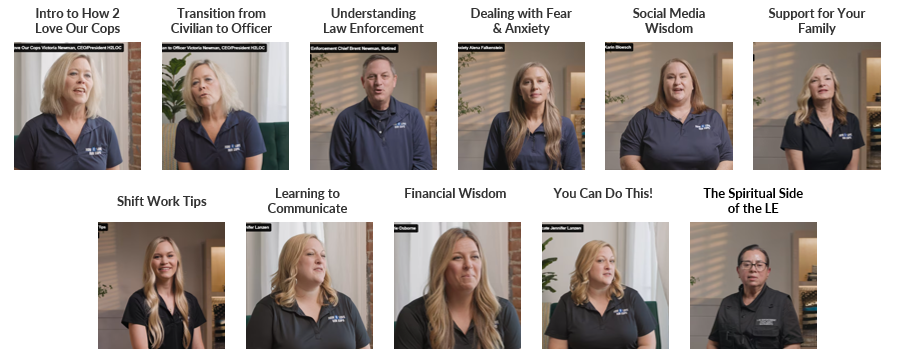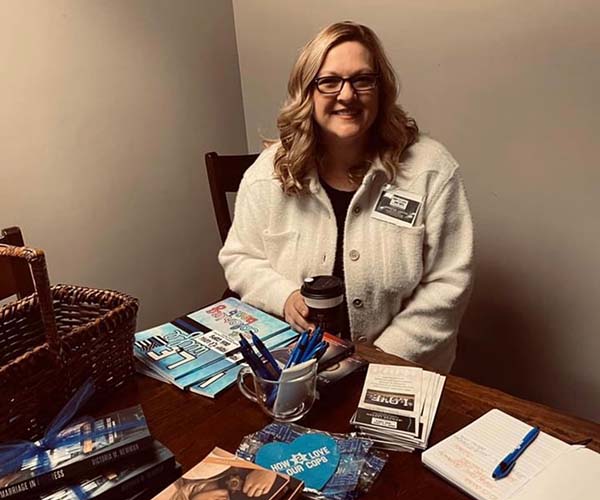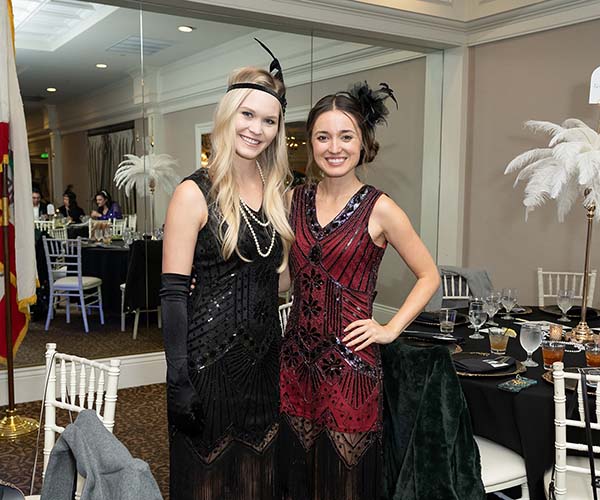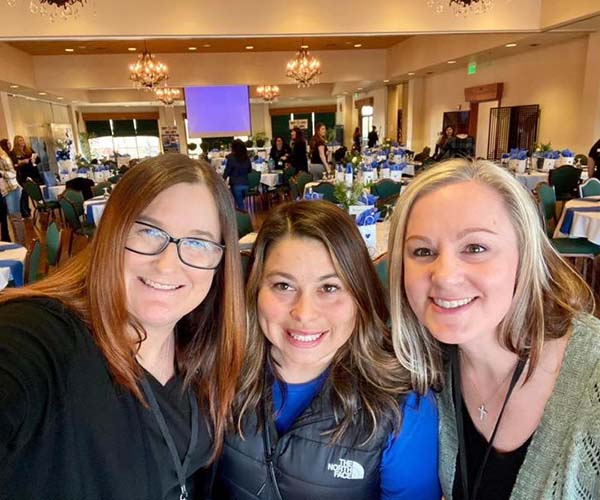New Officer Family Resources
Find all the information you need as you begin your journey in law enforcement.
How 2 Love Our Cops
Are you a new Blue Family? We are here for you! As you embark on a new season of supporting a loved one new to law enforcement, we want to come alongside you and support your family. Why? Because we've been there and understand the challenges that come with this job.
Need to talk with someone confidentially who gets it? Look into our peer support program and Reach out for Support or follow the link at the bottom of this page.
Looking for more information? We have resources, events, and programs designed to help you in all aspects of the LEO life. Sign up for our newsletter and event announcements, or contact us with specific questions.
ANNOUNCING OUR NEW VIDEO RESOURCES FOR NEW LAW ENFORCEMENT FAMILIES!
Use the button below to access to our library of video resources
FAQ for New Officer Families
Absolutely! Especially the first year as you get used to the police life, and in seasons of craziness nationally and/or locally. This job comes with risks and unknowns, so we must put protections and protocols in place to prepare should something happen. Here are a few suggestions:
- Be intentional to create a healthy relationship through good times and hard times.
- Spend the money for life insurance and disability insurance—ensure you are both taken care of should
injury or death occur. - Get a living trust and a will in place. Update them and beneficiary information current.
- Have your officer go over the agency’s protocols in case something should happen.
- Have those crucial conversations sooner than later.
- Build a support system now, so should something happen, you have people who will be there to help you.
- Talk with other respected and seasoned cop family members—they are a wealth of information!
Hard to say. Some find this helpful. But there are many situations in which it has further traumatized the listener. Ask yourself what you’re hoping to accomplish—and investigate if this is the way to do it.
Your officer will deal with many people who won’t appreciate being held accountable for their crimes. He/she wants to protect you from anyone looking to retaliate in some way. In these unsettled times for police officers, this is one less worry!
The transition from civilian to civil servant can be hard on the body, brain, and soul. The sights, smells, and repeated contact with people who are mad, sad, and/or bad can be difficult to come to terms with. Stress and its chemicals are also hard on the body, so there could be several layers of phenomena going on. Anger, irritation, withdrawal, and insomnia can be signs that your officer needs you to look beyond the symptoms and put gracious empathy in its place. Have a safe and open conversation to gain understanding. Do some research on how to help. Talk with respected wives near you. Contact our peer support. Knowledge is power—and educated loved ones are
the best assets our officers have!
First off, policing is very different than other careers. Shift work, risk, use of weapons, social stigmas, dealing with crime and criminals, and many other factors contribute to stress, trauma, and a hardened view of life. The hours, chemical releases, and hypervigilance will have short term and long-term effects if not proactively dealt with (exercise, role balance, rest, etc.) There must be the expectation that this career will affect off-duty time. This career will affect mind, body, soul, and decisions made every day. Like where your officer sits in a public place or how he
parks his car. The exposure he/she gets on duty will affect the ways they think and act and protect.
As family members, we can expect or demand that this career not affect our family life—but it is unrealistic. We unfortunately have seen these unrealistic expectations tear families apart. We’ve seen officers isolated from their families, which only creates separation. We’ve also seen families get educated and equipped to help their officers cope, heal, and thrive so that they are a healthy family unit!
Three things: 1) Educate and equip yourself. This life is a mystery to those who haven’t lived it, and there is a plethora of information, help, support, and resources. We at How 2 Love Our Cops are constantly working to help you with this! 2) Build a support system that includes people who are supportive of law enforcement and your marriage. It’s best to have friends and family who are law enforcement AND supportive civilians. 3) Commit to a lifetime of continual and open communication. When evaluating your communication with your officer, know that progress, not perfection is the desired result. Good communication takes a lifetime to perfect!
Here are a few actual answers others have given:
- “He works for the city/county/state/government.”
- “I could tell you, but then I’d have to kill you.”
- “She’s a street cleaner for the city.”
- “He’s a garbage collector!”
- “She’s a first responder.”
- “He’s a superhero, and I can’t divulge his whereabouts, true identity, nor his special powers.”
Have a special code word between you—and when he/she says this word, you separate and meet up later in another location. This requires you and your officer to actually come up with a plan ahead of time. When kids get to an age when they can understand, talk with them as well.
Purchase the best health insurance available through your or your officer’s agency—which may or may not be the cheapest option. Make sure you get a life insurance policy when you/your officer are young and healthy that will meet the needs of your family. We also strongly recommend disability insurance even though it can be costly. The odds of job injuries are much higher than death itself on the job, and departments vastly differ in their policies on injuries. Do not assume your agency will fully take care of your family when there is an injury! Experience has taught us here at How 2 Love Our Cops that it is more often the case that what departments offer is inadequate. You must protect your family in case of injury.
Absolutely. A lot of times spouses/families have completely stepped in it when it comes to social
media. We cannot stress enough the seriousness of careless comments and posts online. Here are guidelines for social media for police families:
- Keep in mind someone is always watching and listening—private pages usually aren’t 100% private.
- Never post personal and identifying information on public pages—send private messages.
- Never give out financial information online.
-
When posting articles, remember who your friends are. Don’t be surprised when people close to
you are not supportive of law enforcement or have misinformation. - Remember your intentions/tone can be misinterpreted depending upon the words you use.
- Never post where you are currently or when leaving on vacation.
- Ask permission to post photos related to your officer’s work—don’t assume it’s okay.
- Don’t discuss politics or rants about your officer’s agency online—it always gets back to them.
-
When a critical incident happens, hold off saying ANYTHING (including “prayers for so and so”
and badges with black ribbons for your profile pic) until you are positive the information has been released by the department. Too many families/close friends find out about tragic accidents or loss of their husbands online! Do not contact survivors until you have proof they have been contacted. -
If you have a beef with someone on a group page, contact that person directly. Don’t be “that
guy” who drudges up drama for all to see. - Before commenting on pages with info your officer has told you, think twice and check with
him/her.
Any time there is a change (marriage, divorce, birth, etc.), and once a year. We recommend your officer look it over at yearly job evaluations.
- Over-communicate. Reminders are needed. Started the day without a kiss? Send one in a text!
- Try to eat one meal a day at the table together. If you’re in different locations, use FaceTime to eat “together”.
- Keep a big visual family calendar in the kitchen or office, AND keep a shared calendar on an app.
- Have a business meeting once a week for finances, calendar discussions, kid pick-ups.
- Schedule dates on a regular basis and make them top priority.
- Set the alarm in the middle of the night for sex.
- Schedule texts of “I love you” or encouragement while you are apart.
- Take the vacation! First couple days are just for sleep/rest, then do fun stuff together towards the back end of the trip.
- If your officer has worked without a day off for over a month, consider a combined sick day—spend the day in bed, order in and get rest before you really come down with something!
More than he/she gets! Seriously. Do the math with bricks in a backpack—one brick added for every waking hour, two bricks out for every hour in sleep. Too many bricks left in the backpack add up—and make it hard to function.
It depends. There are two kinds of overtime—mandatory and elective.
Mandatory overtime gives no choice in the matter. Usually, this overtime is only required for disasters, rioting, and other huge events in the area, and therefore there is an end to it. However, because of the shortage of officers in the last few years, this has become a normal practice. There are fewer officers, so the ones who are there must make up the difference. Departments are recruiting like crazy right now, so hopefully this will change soon. As far as the
family goes, we must make the best of this in the interim—it’s out of our control, and it’s out of our officer’s control.
Elective overtime is under the category of what you CAN control, so this is a conversation with your officer. There are a few considerations for this conversation. First, sleep is very important for the health and safety of your officer, no matter what age. Make sure your officer is getting adequate sleep when considering overtime. Second, your relationship is important both in short term and long term. Make sure you both are on board with the amount of overtime and the scheduling. Third, overtime can be very helpful for the finances. But, NEVER count on overtime to
pay the bills—live on your regular salary and use overtime for extras. Many officer families have gotten themselves into financial trouble by incorporating overtime into their monthly budget.
Get used to it—cop stuff needs a place and space, especially if (s)he’s on call. A small closet is best with hangars, pegs, small baskets, and a safe for weapons. How about a locker at home painted to match your décor? My son-in-law had a small alcove in their apartment with drawers only. He covered it with a sliding barn door, added a dowel for hanging, and the safe up high. Perfect—and it was really cute!
Yes. This is a thing—just go with it! I once witnessed a couple in Panera Bread—clearly both were
cops—discussing which one of them got the seat that watches the door. She won—because she was in uniform!
This is probably best put together with your officer to make sure it’s realistic, but here are some links to templates:
It depends on how old they are, and their maturity level. Keep it G for the little ones, obviously. But as they get into school and hear negative comments about officers, they’ll need more explanation about what’s true and not. A lot of times they’ll ask questions when our officers aren’t around. It’s okay to give positive, more generic answers then have your officer add more later. This is a great conversation to have as a family. Talk about social media rules. Talk about weapons and the boundaries. When your kids ask questions, make sure you know what is driving those questions before you answer. If departments allow, take older teens and young adult children on ride alongs—this gives perspective nothing else can. It’s tricky to know what to talk about with kids—each one is so different. But it’s necessary. General rule—ask before answering, and always get context.
We have a huge list of resources right here! They have been vetted by us, but of course not everyone needs the same help. Look, and if you can’t find a lead, contact us. We’ll do our best to help where we can!
It depends on where you are and who you’re with! Heading to the mall in Los Angeles? Probably not. Serving the homeless in Detroit? Nope! But in Washington DC during Police Week? Probably okay, since just about everyone is in the same garb. Use discretion—and notice the vibe. Bring a non-descript sweatshirt to wear just in case. When I wear my How2LoveOurCops shirts to the grocery store, I make sure I’m extra kind to people, and am ready to answer calmly if someone says something snarky.
Get a gun safe and keep the weapon in it—no exceptions!
Talk about the weapon—have your officer show you the weapon, explain, and answer questions about it.
Educate your children about the gun and the rules about touching it, when friends come over, etc.
Oh, by the way, always have a key to the handcuffs available at home, just in case your kid puts them on as a joke. Yeah, this has happened.
Peer Support
|
Need to talk with someone who understands?
Want to talk with someone who's been there? Go to the peer support page where you can submit your contact information confidentially, and one of our trained peers will respond as soon as possible!



